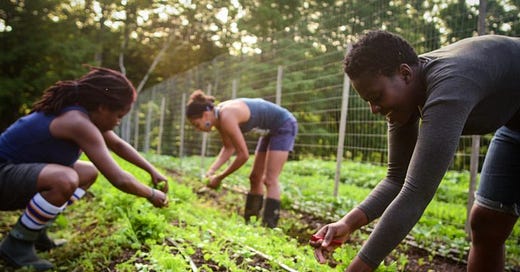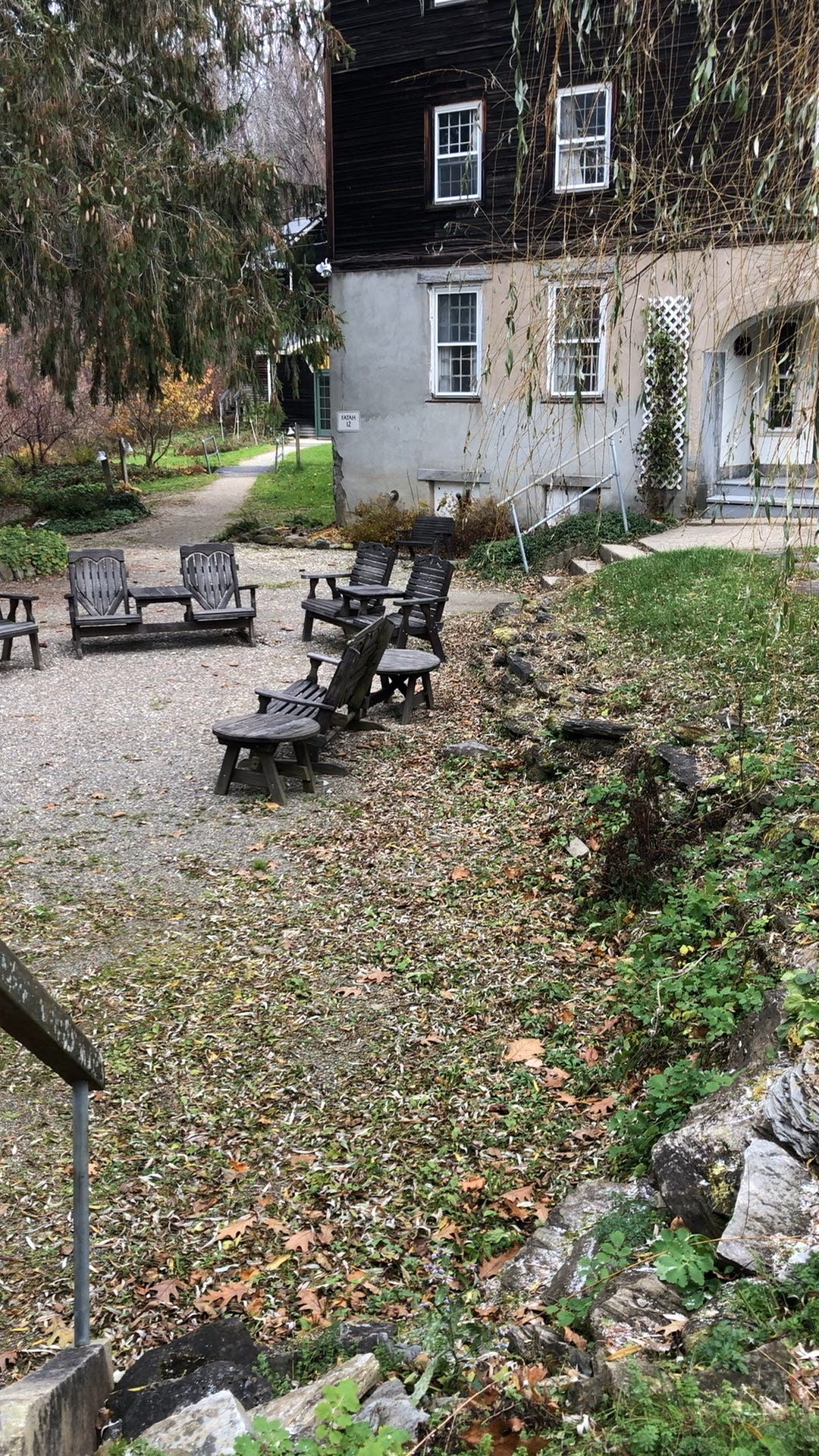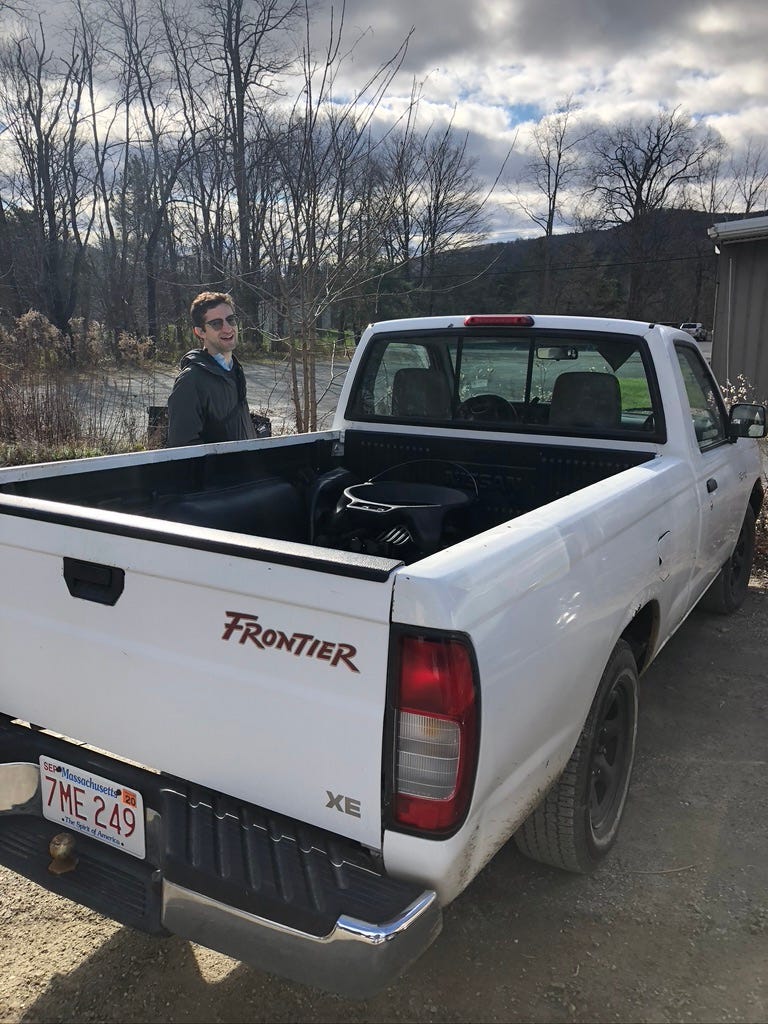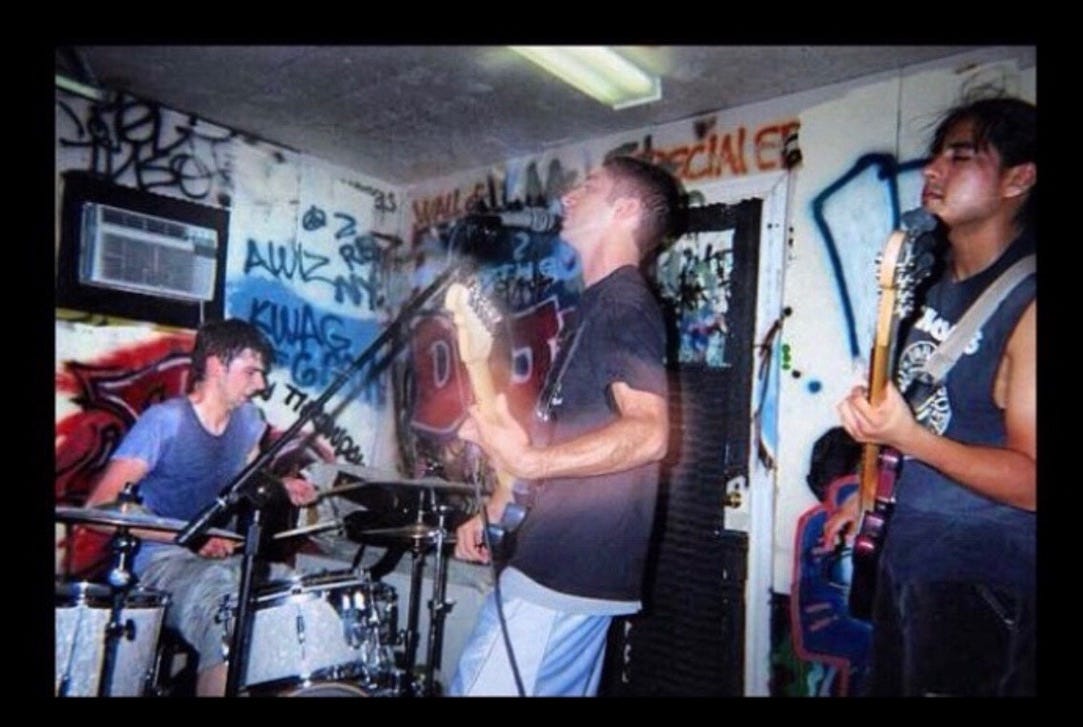Friendly Weirdo Homesteaders
Thoughts on finding and befriending your people, and finding land on which to live
Edit: Since publishing, I wrote this thread as a TL;DR and collection of my thoughts the last few days, since sending out this edition of TTSE.

I recently ran this poll on Twitter:

The majority of respondents(37.5%) said, “Yes, part-time”.
I’m taking that as a signal to focus my writing here, to align with my own desire to move from NYC to communally-owned land in the country.
My goal is to become a Friendly Weirdo Homesteader(FWH).
In the next few months, I plan to visit different homesteads and land projects, to see if there’s one I can join, and to research possibly starting one on my own.
With discretion and respecting the privacy to the inhabitants, I plan to write about these visits in this newsletter.
In this newsletter, I plan to document my transformation from disgruntled city dweller, to contentedly-disgruntled Friendly Weirdo Homesteader.
It may take years but that is the plan.
If you are a FWH, I would love to connect! Twitter is probably to best way to reach me–my dms are open.
Becoming a Friendly Weirdo Homesteader
I came across the term Friendly Weirdo Homesteader in a Signal thread I’m in, that consists of FWH’s and those interested in homesteading/land projects.
If you were the originator and you’re reading this, grazi! Give me a shout and I’ll buy you a coffee and send you a free paid subscription if you’d like.
If you’re reading this post, I’m assuming you are a FWH, or have plans or dreams to become one too.
In this post, I’ll share my experiences in researching how to become a FWH, and how to meet other FWHs, for the purposes of friendship, learning, and possibly joining their preexisting land project/homestead.
What Is a “land project”?
A land project is just a fancy term for a homestead. I would say that the term “land project” has a leftist/anarchist bent. Often, a land project is a homestead project that is communally-owned or run, and is shaped by a shared politics of its members.
I’ll use the terms “homestead” and “land project” interchangeably”.
All Roads Lead to Home(stead)
For this post, I’ll share six mini-"case studies”, on ways to find, join, or possibly start your own homestead.
I like the case study as a format, because of its structure, which is:
problem > turning point > solution
The problem section is the backstory, and provides the “sand in the clam shell”, that produces the itch to seek a homestead to join.
The turning point might be something like:
“This is when I knew I could no longer live in the city and I had to make moves to join a homestead.”
“That’s the moment that I knew that this particular homestead was not the one for me.”
“That’s the moment when I felt I’d found a community which I felt confident about moving into.”
The solution is merely the present-day reflection of what has changed. Maybe something like, “that’s when I realized that all retreat centers are kind of screwed up in the same ways” (I lived at one for nearly a year in 2018, and came to this realization).
My goal here, in breaking down these six paths to finding and joining/creating a homestead, is to provide a path for readers to move one or two steps closer to making their homesteading dreams a reality.
I will say what I share here is 100% anecdotal, and your mileage may vary.
If I’m missing something or you’d like to chat, hit me up on Twitter, or leave a comment here.
Table of Contents
Things to consider
Mini-Case Studies
Ask your friends - Steve
Ask your networks - Earthbound
DYOR and reach out - Kailash
Seek out the new - CabinDAO
Take a big chance - The Abode of the Message(RIP)
DIY - Find a way to finance some land
Where I’m at in this process
Hopes and Dreams
What I’m seeking to join or build
Things to Consider in Homesteading
I should state upfront that I’m looking at the idea of homesteading with some experience, age, and privilege. Also, I work remotely.
I’m 36, I work in tech marketing and DAOs, and, as previously mentioned, I’ve lived at a Sufi retreat center in a small town in Upstate NY. Some of my friends up there were homesteading, so I was able to witness first-hand what it’s like.
At the retreat center, we had a farm. As residents of the retreat center, we also had chores to do such as cooking, and servicing the retreats with our labor. It was rural-ish, more of a small town(Population: ~2000). That said, we were 20 minutes from Pittsfield, a town of about 50k people. We were also a 40-minute drive from Albany, Hudson, and the Berkshires, and about two hours from NYC.
It was out there, but not out there out there.
Still, it was a pretty quiet life living in a mountain valley in New Lebanon, NY–compared to living in NYC.
Nighttime was dead quiet. You could see stars. It was beautiful out there.
Sometimes it got really boring.
There wasn’t much to do out there. Most of our excitement came from the retreats that would come into town, or visiting farmers, artists, and assorted seekers and wanderers. Every Wednesday was “sauna night”, when up to 9-10 of us would pile into a tiny coil-activated sauna room in the basement of one of the lodging halls, and sweat for a couple hours.
At the Abode, we generally cooked 4-6 shared meals per week, often feeding 40-200 visiting retreat-ers in the process.
Having a car was a must. Often I would drive to Hudson or Pittsfield just to go to a coffeeshop and to get a sandwich and work from my laptop.
I was 33 and single when I lived there. I suppose that there was some sort of social scene at the Abode, between the Abode, Abode Farm, the art residency there, and maybe 20 or so 20-35 year olds. Suffice to say, everyone ends up dating everyone at a certain point.
Compared to NYC, the Abode was definitely less… busy. But that’s kind of the point, I guess.
At a certain point, I decided to broaden my horizons beyond the Abode/New Lebanon and I put an ad on Craigslist looking to start a band.
Which was fortuitous, as I was one of the first of the Abode residents to get evicted, and the Abode struggled to keep its doors open.
They eventually evicted all the residents. Last I heard, the property was sold. To whom, I do not know.
Mini-Case Studies
In writing this post, I’ve realized it’s kind of funny to write case studies for what is basically a handful of ideas about how to find or make a homestead project.
But hey, why the hell not?
I’m writing here to explore the limits of my knowledge and experience, and to connect with others and hear about their experiences.
So here we go, here are six ways I’m conducting my search for a homestead or land project to join.
One: Ask Your Friends
Tomorrow, I am flying to Seattle to visit my buddy Steve.
Fun fact: Steve is a paid subscriber to this newsletter. Thank you, Steve!
I’ve known Steve for a while, I actually met him at YMCA summer camp when we were like 6, but we didn’t truly become friends until I started selling him weed after high school.
We eventually started a little band in my parents garage with our buddy, Victor(who coincidentally runs this little homestead and farm in Central Texas).
Me and Steve have been talking about how we both wanna get out of the city, and move to the country. We’ve even talked about buying some land together in the PNW.
While I’m in Seattle we’re going to visit his girlfriend’s farm, a land project on the other side of the Puget Sound, and possibly a co-housing project in Portland, OR.
I’m excited to go out there and check these different projects out. The PNW seems like kinda of a hairy, scary place to live, with forest fires every year, increasing crime rates in Seattle and Portland, and everyone waiting on The Big One.
Still, I would move out there if I found the right homestead to join. I’ve always loved it out there, mostly the climate and the nature. It would be good to move somewhere where I have at least one close friend. I have some extended family in Seattle as well.
Luckily, I’m not in any rush.
I’d say though, if you’re looking to join a homestead/land project/farm, asking friends and family is probably the place to start, along with googling around to see what’s in your area.
Two: Ask Your Networks
Via the Signal thread I mentioned earlier, I’ve connected with a few land projects that I plan on visiting in December when I make my drive down to Austin to live at Neighborhood Zero from a couple months.
I am very much looking forward to spending most of the Winter in Texas and not NYC!
While I can’t invite you to the Friendly Weirdo Homesteader Signal thread, dear reader, here’s a list of Discord servers where you might find some good leads on homesteads/land projects that are open to people visiting or joining:
Poor Proles - Left-leaning self-sufficiency and food sovereignty. Excellent podcast!
CabinDAO - Crypto/web3 “decentralized cities” project. This is where I’m going to live for a couple months in 2023. I talk about CabinDAO in its own section in this post, as I will be living there from Jan. to March in 2023.
Doomer Optimism - “A collective dedicated to discovering regenerative paths forward, highlighting the people working for a better world, and connecting seekers to doers.” I’m a big fan of @rizomafieldschool’s tweets. They have a great podcast too.
Solarpunk Nomads - Solarpunk van nomads working to build waypoints for Solarpunk travelers.
Three: DYOR and Reach Out
I’d estimate there’s a hundred or so active “intentional communities” active in the US. It can be challenging to find a homestead/intentional community this way, because space is often limited, and sometimes you need to buy property to join some of these intentional communities.
The Directory of Intentional Communities is a great resource.
Still, if you seek to live on the land, doing your research on the computer is a necessary step.
Also, I’d encourage you to check out Kirsten Dirksen’s Youtube channel. She’s a documentary filmmaker. She travels with her young family to different land projects, homesteads, and intentional communities and makes short video documentaries where she interviews the inhabitants.
I love her work. She’s how I found out about Kailash EcoVillage in Portland, OR, which I hope to stop by and see when I’m Portland next week.
Kailash is remarkable because of it’s simplicity, accessibility, and what they’ve accomplished. The originators of the community bought an old apartment complex in SE Portland 30 or so years ago. Inhabitants pledge to contribute a small numbers every week to helping to run Kailash, which is normal for any intentional community.
What’s really impressive is that they de-paved the 1-acre parking lot behind the apartment complex and built a beautiful garden and farm.
If you’re not familiar with the process of de-paving, they basically had to go in and break apart the asphalt parking lot behind them, one piece at a time. If I recall, this process took a year or two, and many community members and volunteers.
The beautiful thing is that, once you’ve been interviewed, you simply rent a room or an apartment in the building. I find that I like this arrangement because it’s not complicated or precarious like I found my situation at the Abode to be. Other intentional communities or land projects I’ve researched required you to buy property to join the community, or to go through complex probationary periods.
I think that if I start my own homestead, I will make the process to join clear, simple, and affordable to join, like Kailash has done.
Four: Seek Out the New – CabinDAO
I’m going to live at CabinDAO’s Neighborhood Zero from January to March in 2023.
But what is Cabin, and what is Neighborhood Zero?
Cabin is a "network city for creators”. CabinDAO is governed by a DAO, and decisions are made collectively by the DAO.
Cabin is informed by the idea of the “network state”, which is an idea from Balaji Srinivasan, a VC and Twitter personality.
Per Balaji:
“A network state is a social network with an agreed-upon leader, an integrated cryptocurrency, a definite purpose, a sense of national consciousness, and a plan to crowdfund territory.”
Cabin seeks to create a network of properties, by ownership and partnership, to realize its vision to build a “network city for creators”.
Neighborhood Zero is Cabin’s first property, and is situated in Dripping Springs, TX, about 45 minutes outside of Austin. There, they are constructing shed houses for people to live in community together.
They’ve been releasing videos of recent builds over the past month or so. You can check out the first video in the series here:
CabinDAO is working to expand their network. If Cabin sounds cool and you’re interested in integrating your homestead into their network, give me a shout on Twitter and I can intro you to folks there.
For a summary of what’s been happening at Cabin most recently, check out Cabin founder Jon Hillis’ post, “Caretaker’s Notes: Fall 2022”.
As I haven’t lived at Cabin yet, I don’t have any learnings to share just yet. If you’re curious about them, check out their Discord server. They’re good people.
Five: Take a Big Chance: The Abode
What I Learned from Living at The Abode
I realize the Abode is not exactly a homestead, but it’s the closest thing I have experience with.
Here’s what I learned:
Living in the country gets boring sometimes. I’m a city kid, used to hustle and bustle. From living at the Abode, I learned that, after a certain point, you get to know everyone around you. It’s good to stay busy with projects where you live, and to get away when you can.
I don’t think I’d live at another retreat center. While living at the Abode, I was active in helping to organize the residents to challenge the administrative office and the five- or six-person Board of Directors, on a few occasions in my one-year tenure there. It was exhausting. The Board and the administrators were constantly coming up with arbitrary new rules for the residents. For the next land project I join, I will seek to know how power is distributed, and shared, before I move in. Not being evicted is a strong incentive to start my own homestead, but I would only do that with friends and/or a partner. I’d prefer to join one if at all possible, at least to get myself re-oriented to life in the country.
It’s worth it, even if it doesn’t “work out” in the end. I’m always amazed when people seem interested or impressed when I tell them I lived at a retreat center in the mountains/woods–“a commune, far out!”. Even though I eventually end back up in NYC through a circuitous chain of events, I’m grateful for my time at the Abode. It was a really special place with a unique history. I made a lot of great memories there, and it gave me a taste of what living on the land in a small community feels like–it’s rhythms, it’s good and bad, and how it’s meaningful.
Six: DIY – Build Your Own Land Project
There’s tons I want to share here, but I’m near the email length limit for Substack so I’ll be brief.
Some things I’m excited about in regard to starting and building my own land project are:
USDA Loans: 30-year 3% fixed-rate with no money down? To buy a farm? Hell yeah, sign me up. The only reason I haven’t pulled the trigger is because I don’t have a full-time job, which I believe is a requirement. I’m not in any rush to find one–I’m happier freelancing. However–I am looking for the right full-time role for the sole purpose of securing a loan to buy a farm. Also, you have to have a yearly income that’s within a specific range, and can’t be over the median income for the county you live in. At some point in the next year, I may apply for a USDA, and if I do, I’ll write about it here.
TinyBox: TinyBox is a 107 sq. foot dwelling that is modular, can be built in two days, and is $20k. It also classifies as a temporary structure, so no permits are needed. The founder, Oliver, joined a bi-weekly call at Cabin called, “Hopes and Dreams”, and gave us a walkthrough of TinyBox. I was impressed. It definitely seems viable to buy some land and 3-4 TinyBoxes to set up a temporary homestead.
That’s all for now. Thanks for reading!
I Want to Hear Your Story
If you’re reading this post, and you’re homesteading, or have experimented with living on a homestead or land project, I’d love to hear your experience in the comments!








I've reached out to you on twitter but haven't heard back from you. Good read, thank you. I have also framed my vision for people living together on land as a 'Network State', like CabinDAO so I will be checking out what they are doing. I've gathered a good amount of resources from this post, and your twitter feed, so thanks again for that. Good luck moving forward.